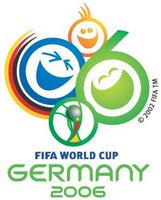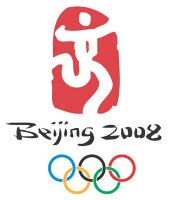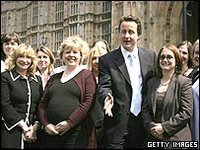
I went to an
IIC event in the week concerning World Cup 2006 Coverage and the Web 2.0 impact on it, here are my notes.
The large World events of sport have historically been linked with the emergence of nations and the introduction of new coverage technologies and techniques.
Sport is interesting for broadcasters and media generally as it brings in those hard to deliver young males, attractive to Public Service Broadcasters and advertisers alike.
The Football world cup of 2006 was arguably the first major global online sports event and was the first such event held in the unified Germany, the technologies that were showcased were High Definition, Mobile and Web 2.0.
3 proponents spoke about the lessons learnt.
Ben Gallop of BBC Sport Interactive 
What Ben said was that the numbers of web viewers are still well below those of conventional broadcast the BBC had scaled its operation to be able to cater for around 100,000 concurrent users. The largest audience was not for
England games but was for
South Korea against
Togo which was during
UK working hours, the inference being that for the big event people would view at home or communally, often in a pub.
Neil McIntosh of Guardian Unlimited
Neil spoke about the successes of the Guardian Unlimited and that online advertising is

currently riding at a high with Guardian Unlimited being a growing and profitable part of the Guardian business.
Neil identified long term sports fans who were loyal and committed against those ‘major eventers’ who came out of the woodwork for the big tournaments, these were particularly fickle and were at the centre of the battle ground for eyeballs and ears.
The Guardian had used an experienced broadcaster James Richardson for podcasting, as well as minute by minute match commentaries (created while watching TV) and blogs similar to the comment is free strand.
Leon Benjamin author and co founder of Business For GoodFrom a more left field and IT background Leon Benjamin spoke about his involvement in an

independent humorous sport podcast. Leon who is a strong proponent of community working and author of
Winning by Sharing had with some colleagues launched a podcast around the World Cup 2006 –this to test the water and see if it could commercially pay its way, the feeling he had was that it probably could but advertisers and other media organisations were risk averse, Leon believed that
UGC was key and untapped in such endeavours.
General
User generated content and camper vans both help bring community and involvement to such tournaments, such sporting blockbusters are not just about individual games and/or events but also about humour, news interaction and communities of interest.
The main media companies have generally secured rights and other smaller media companies or those without rights are forced to be creative around the edges often bringing a tongue in cheek perspective to the table.
The integrity of Soccer Rights are important and the BBC had used
geographic blocking to ensure that content did not stray outside
UK.

The conclusion is that we can expect even more exciting and stimulating coverage for Beijing 2008 than we’ve had for sporting events to date, it will also be different as there will be diverse audiences, grouping around nations, regions and types of sport. China 2008 is going to be an enormous story in so many ways.


 Edison, who used the power of thoughts close to sleep.
Edison, who used the power of thoughts close to sleep.











